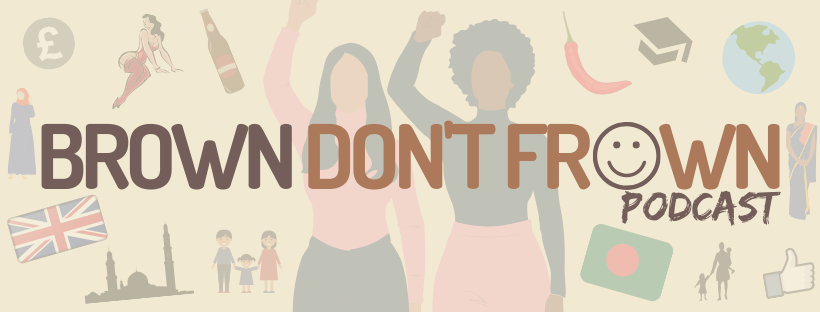
Brown Don't Frown was borne out of a personal journey with womanhood. As a British Bangladeshi, navigating mainstream Feminism often felt exclusionary to me because it didn’t seem to value the experiences or views which shaped my grandmother’s, aunts’, mother’s or friends’ lives. Through this podcast, we seek to build a more inclusive discourse, which breaks down presumptions about different cultures, and shines a positive light on the stories of underrepresented women. Featuring new guest(s) from different walks of life in each episode, Brown Don’t Frown seeks to engage ordinary women and facilitate openness towards entirely new perspectives. It hopes to spark honest and meaningful conversations about intersectional feminist themes in contemporary society with the acknowledgement that our views are shaped by our cultural, racial, religious, social and political experiences. Whether it's discussing society's preconceptions about the Hijab with a British-born Jamaican Muslim woman or examining the impact of gendered expectations on our ability to grieve on our own terms, we hope listeners finish each episode feeling more rounded than they did before. Follow us on: Instagram: https://www.instagram.com/browndontfrownpodcast/ Twitter: https://twitter.com/bdfpodcast?lang=en Facebook: https://www.facebook.com/browndontfrownpodcast LinkedIn: https://www.linkedin.com/company/browndontfrownpodcast
Episodes

Sunday Jun 27, 2021
Season 4: Ep 35 - Urban planning, spatial inequalities and feminist cities
Sunday Jun 27, 2021
Sunday Jun 27, 2021
Deborah Broomfield is a doctoral candidate in Women and Planning. Her research focuses on spatial inequalities, urban planning and their intersection with deprivation, race and class. Urban planning overlaps with both politics and technical knowledge because of its focus on land use and the built environment, encompassing infrastructure, water, the air we breathe, transportation, networks, and communications. Deborah talks about her career journey and how she got into urban planning later in life.
I ask Deborah how she thinks urban planning will respond to the challenges we have seen during the pandemic, such as limited mobility and increased home-working and how we might respond to future environmental threats. The role of safety for women and girls in public spaces has been rising up on the public agenda, particularly since the Sarah Everard case. How do we plan more effectively with women in mind to improve our towns and cities without encroaching unreasonably on our privacy? Redesigning a city with a feminist philosophy is one where all sexes can be treated equally; it’s ultimately about security and services, and being mindful of how men and women use space differently. We look at some examples of safer cities for women and how they make a difference.
We also reflect on the intersection of race and space and how the impacts of climate change affect the vulnerable and poor the hardest.
Follow Deborah on Twitter: @DebsBroomfield If you enjoy listening to this podcast, please consider supporting it so it can continue to provide you with engaging, meaningful content. You can donate via Patreon: www.patreon.com/browndontfrownpod.

No comments yet. Be the first to say something!